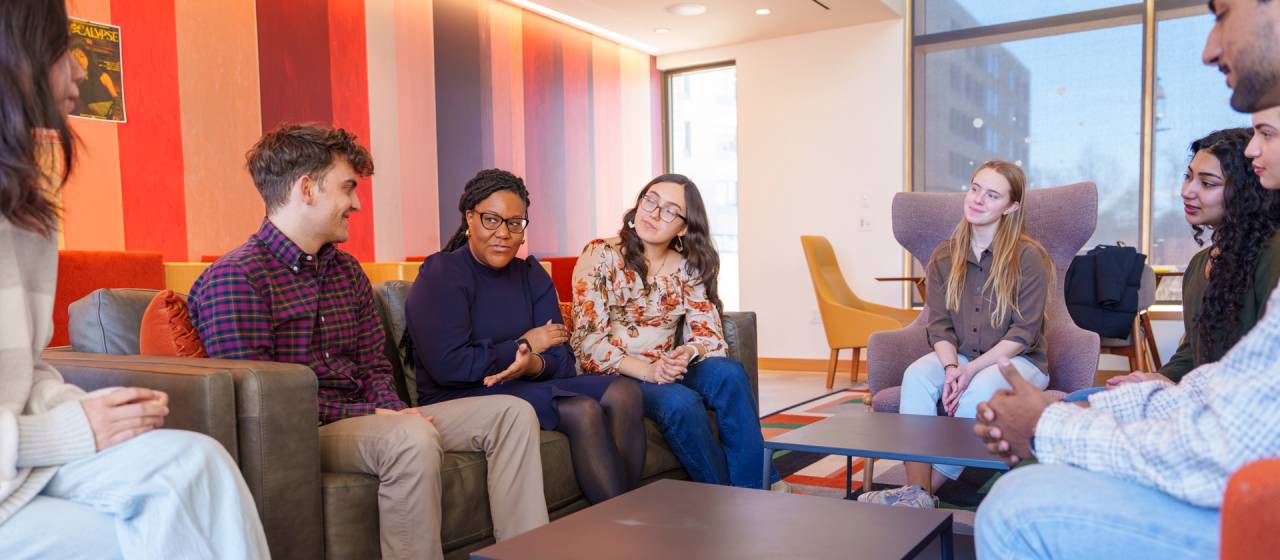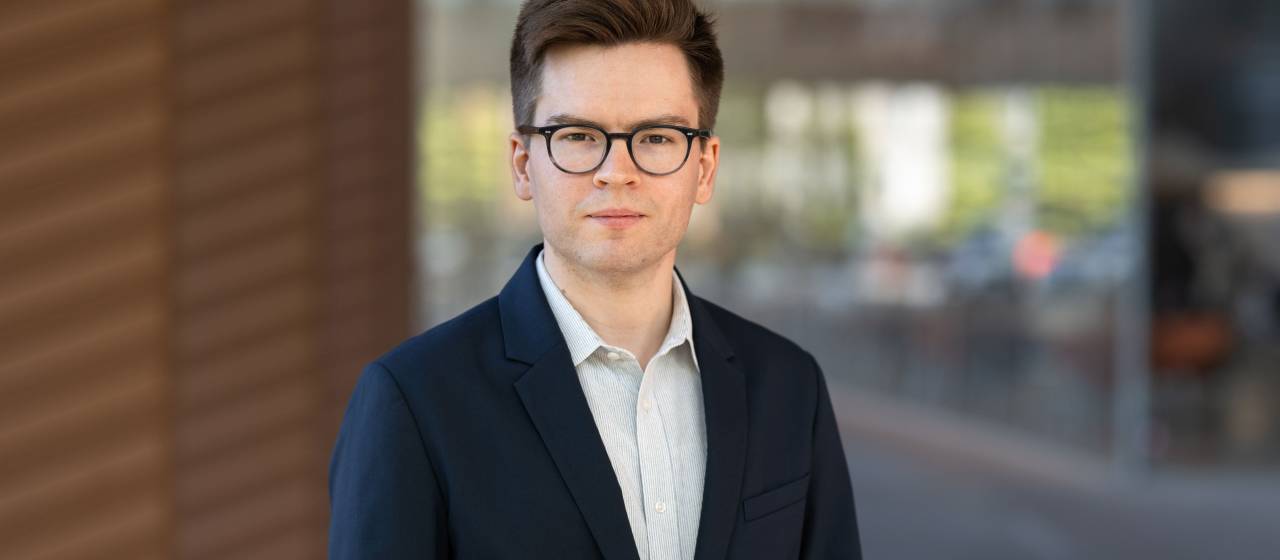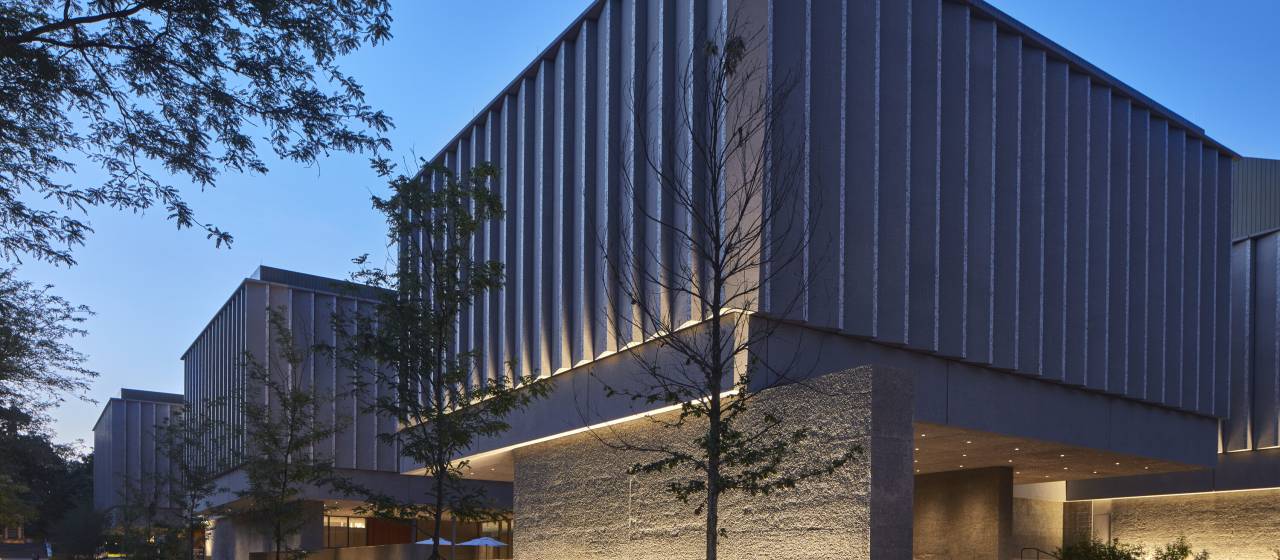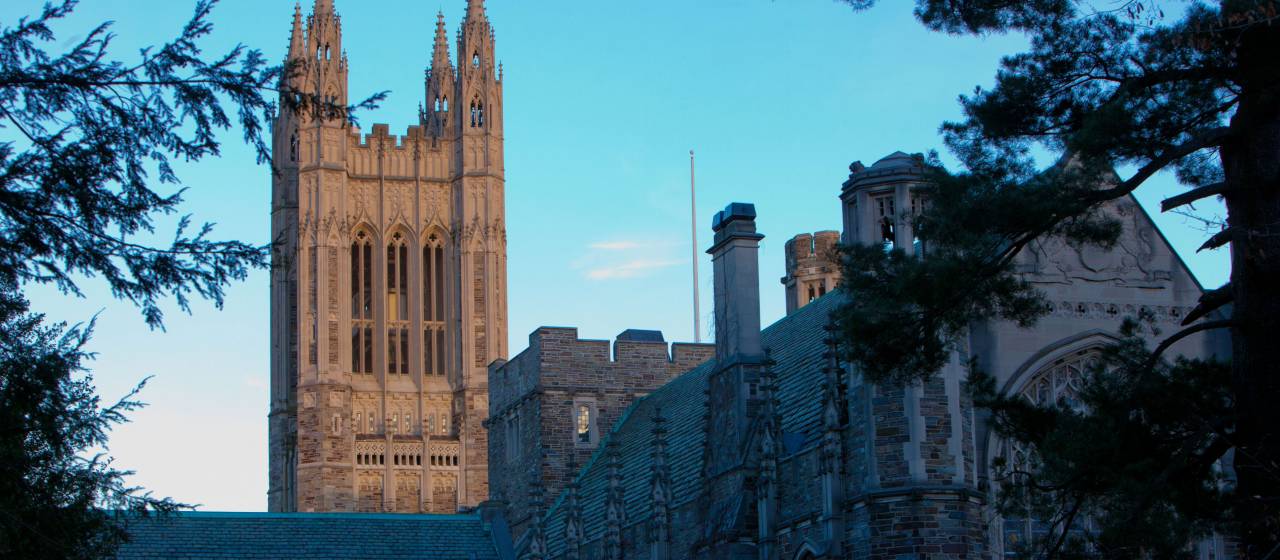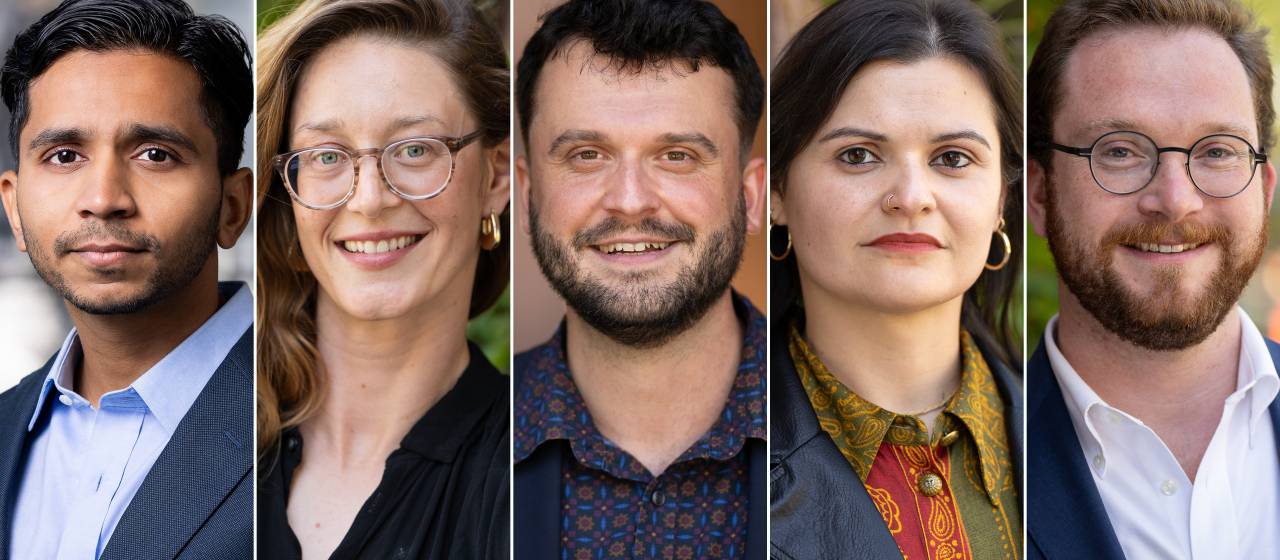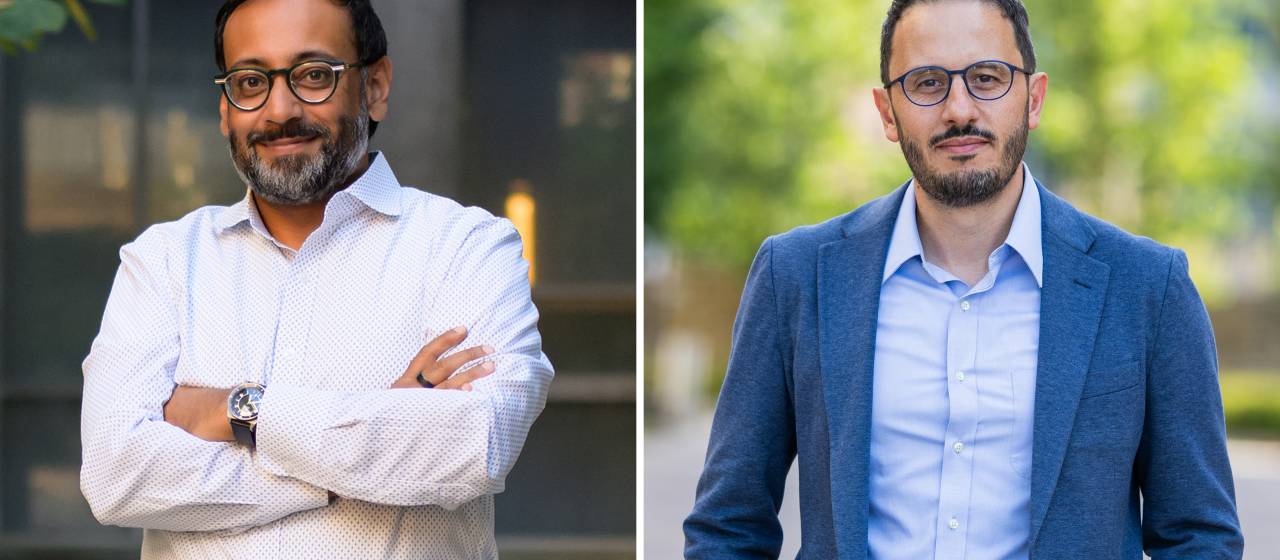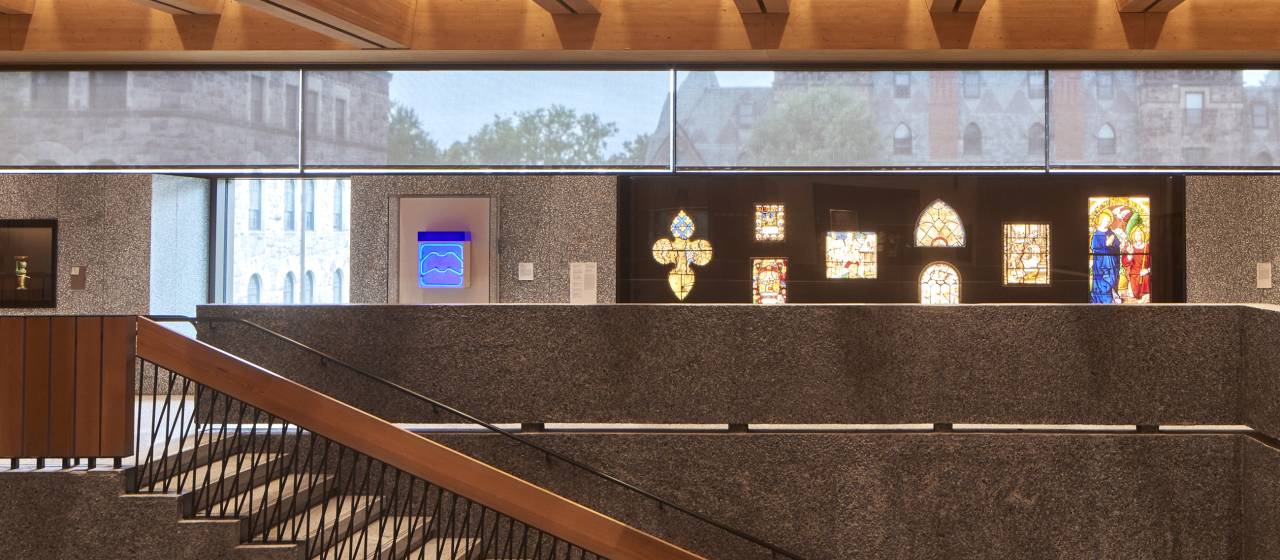Civil and respectful dialogue on difficult topics: A bedrock Princeton commitment
Princeton’s research and teaching mission rests on a bedrock commitment to free expression, where thoughtful people of all backgrounds voice their opinions in civil discussion.
As University President Christopher L. Eisgruber emphasized in his 2025 State of the University letter, “ours must be a community where all members can speak their mind and where they engage in civil and respectful dialogue, even on — indeed, especially on — difficult topics.”
This value plays out every day across campus — around seminar tables during class and around dining tables at dinner, among the most senior faculty over afternoon tea and incoming students during Orientation, just to name a few. The University collects and reports data to hold itself accountable in fostering respectful dialogue across differences.
Testing arguments and hypotheses yields stronger ideas, and listening to each other fosters deeper community.
"The right to speak goes best with the responsibility to listen," said University Provost Jen Rexford. "The spirited discourse we have on college campuses is a wonderful opportunity to learn from each other's ideas and perspectives, allowing us to both hone our arguments and, sometimes, change our minds.”
While it’s the occasional loud or unruly dissent on college campuses that attracts headlines, the everyday interplay of competing ideas is scholarly and respectful. University policies lay out Princeton’s expansive commitment to free expression, and its limits. But the norms of Princeton’s relatively small campus and tight-knit community do as much or more to set the terms of respectful discourse here.
We visited the University’s classrooms, public auditoriums, faith-based centers and residential colleges to see what it means to live, study and work on a campus where vibrant discussions among people who disagree vigorously with one another are defined by dignity, consideration and genuine curiosity.
In the classroom: “Disagreement is absolutely essential for the pursuit of truth”
On the first day of his “Ethics in Public Policy” class, politics professor Stephen Macedo shares a quote from John Stuart Mill about the weakness inherent in clinging to just one side of an argument.
“Your arguments are only as strong as your ability to meet other people's positions, arguments and reasons — and to respond to them with better reasons,” said Macedo, the Laurance S. Rockefeller Professor of Politics and the University Center for Human Values.
“I tell the students that disagreement is absolutely necessary for the pursuit of truth. It’s something to be cherished and respected,” Macedo said.
In class, he puts hard questions and controversial issues on the table — including immigration, abortion, the use of torture, and the politics of the COVID pandemic (the subject of his book, “In Covid's Wake: How Our Politics Failed Us” with Princeton colleague Frances Lee). He especially wants students to grapple with difficult ethical and practical problems where important values are in conflict, and the right answer is not clear.
“We want to model civil dialogue. Princeton students are very good at that and eager to do that,” Macedo said. “I make it clear that we’re going to take serious arguments from both sides of the political spectrum.”
In this class and others, he often breaks students into groups, then assigns them to argue one side of an issue or the other, regardless of where they might stand personally. “If they’ve done the reading for class, they should be ready to defend either side,” he said. He assigns other students to be the judges.
In the process, students hone skills that are essential to bring to a conversation with someone who has a different viewpoint — “deep listening skills, asking the right questions and being a little skeptical of what seems like the establishment position.”
“Students have said that they felt more sympathetic with the position, having been required to defend it,” Macedo said.
Vincent Vinh Huu Nguyen, a Class of 2025 math major, took the professor’s course “Expressive Rights and Wrongs: Speech, Offense and Commemoration” as a junior, and remembers the initial awkwardness of having to argue a position that differed from his own. However, he said the exercise “helped me develop clear moral frameworks to think about other issues as well,” not just the cases he was arguing in class.
“Having people challenge me forces me to clarify or reconsider what I actually believe in,” said Nguyen. “Open discourse helps us get closer to the truth. It helps me become better at figuring out what is right and wrong.”
At Princeton, it starts in the classroom and permeates outwards, said Nguyen, who has taken classes in philosophy, politics, public affairs and the University Center for Human Values. “I do this at lunch with friends. We like talking about controversial issues, no matter how personal. I want to talk to people who disagree with me.”
At the podium: Modeling “constructive dialogue”
People generally approach a difficult conversation with one of two goals, said Amaney Jamal, dean of the Princeton School of Public and International Affairs (SPIA). They either just want to tell the other person what they think, or they have a genuine interest in learning something. That second goal requires “constructive dialogue” — a pillar at Princeton SPIA.
Constructive dialogue, Jamal said, “requires talking to the other person as an equal, validating the other person even if you don’t subscribe to their viewpoints, and respecting and appreciating different viewpoints.” This is critical for undergraduate and graduate students at Princeton SPIA who are going out into the world to become policy-makers or work in related fields.
Jamal said some students are initially uncomfortable listening openly to opposing views, out of fear of legitimating them or somehow undermining their own viewpoint. “That makes learning how to have constructive dialogue even more important.”
At Princeton SPIA’s popular Dean’s Leadership Series, “We deliberately and thoughtfully bring together people with differing viewpoints to tackle outstanding policy issues of the day,” Jamal said. Events are open to the public and livestreamed.
In November 2023, Jamal put herself in a chair next to Keren Yarhi-Milo, the dean of Columbia University’s School of International and Public Affairs, for a wide-ranging public conversation moderated by President Eisgruber.
“Keren and I are good friends. She's Israeli, I'm Palestinian,” Jamal said. “We've always supported peace. We disagree all the time, but always through the prism of respect.”
This spring, the series hosted two panels with former and current members of Congress from both sides of the aisle to discuss the challenges and opportunities facing the legislature in this polarized era. A disruption during one of the panels served as a reminder that such dialogue is always challenging, but the speakers and the vast majority of the audience remained focused on the important discussion.
Rachel Morrow, who graduated from Princeton SPIA’s MPA program in May, attended several series events during her time at Princeton and praised the program for helping to foster skills that will be critical to her future as a policy-maker.
“It helped me build empathy for others — beyond their political affiliation or ideology,” Morrow said. “It allowed me to listen, to sit with uncertainty and to be open to the complexity of different issues. It taught me to resist oversimplification.”
Morrow grew up in a small town in Arkansas with neighbors “whose political views didn’t necessarily align with mine,” she said. But they shared common values: family, faith and community. At Princeton SPIA, she became deeply curious about the nature of disagreement and what she calls "the gray area.”
“The gray area is the space between easy answers and absolute positions, where you embrace and even celebrate the tension between competing points of view. There are few places in our society where that can happen. But it should happen at policy school, and it does at Princeton SPIA.”
Rose Castle: “The focus is not on fixing or changing one another”
In 2019, Alison Boden, then dean of the Office of Religious Life (ORL), wanted to help Princeton students from all faith traditions have conversations with one another that did not feel like an infringement of any of their beliefs.
She turned to the Rose Castle Foundation, a U.K.-based nonprofit that helps people who hold opposing viewpoints come together across their differences.
Boden began taking a group of 15 students to Rose Castle — an actual castle near Cumbria, England — during fall break for a week of intensive training. Students attend workshops and breakout groups to learn how people who disagree can come together across their differences.
“The focus is not on fixing or changing one another, but rather on active listening and being in community,” says current Dean of Religious Life Theresa S. Thames, who accompanied her first group of students to Rose Castle last fall.
One of the exercises is a daily “walk and talk” — “You literally go out into the countryside and walk and talk with one person,” Thames said. Walking alongside each other “takes away the intimidation of talking face-to-face,” she said.
Surujdai Mukhram, who traveled to Rose Castle last fall as a first-year graduate student, said practical approaches like this one offered new ways to find common ground with others and to listen more deeply. One of the main tenets of Rose Castle, she said, is that “we’re not here to bring someone on our side, we’re here to understand why they have the views that they have.”
Rose Castle also helps students recognize and develop traits like curiosity, forgiveness and generosity that can help build bridges across divides.

Through Princeton's Rose Castle Society, students learn to recognize and develop traits like curiosity, forgiveness and generosity that can help build bridges across divides.
More than 70 students applied for 15 spaces on this year’s trip, Thames said. “There’s a high demand.”
When they return from Rose Castle, students from each year’s cohort hold on-campus sessions for additional Princeton students. More than 500 students have joined various Rose Castle training sessions on campus, including some led by Rose Castle staff who visit from the U.K. to teach workshops for students and University staff.
Participants tell Thames they use these techniques for active listening with their friends, family members and coworkers. “I’m absolutely proud of Princeton for being one of the only universities in the U.S. that has made an ongoing commitment to the Rose Castle training for our students, faculty and staff; it’s made a difference,” she said.
Whig-Clio Society: “We have more in common than not”
Members of Princeton’s student-led American Whig-Cliosophic Society have been having vibrant dialogue across differences for more than 250 years.
Whig-Clio, as it’s commonly called, bills itself as “the nation’s oldest collegiate literary and debating society.” It was created when the progressive American Whig Society, founded in 1769, and the conservative Cliosophic Society, founded in 1770, merged in 1928.
“Whig-Clio is a space for anybody who identifies anywhere on the political spectrum,” said Sophia Burnston ’27, a former chair of the left-leaning Whig party, who joined Whig-Clio her first semester at Princeton.
Jaden Stewart ’26, a former chair of the right-leaning Clio party, said the society’s approximately 250 members hail “from all over the world with vastly different experiences, beliefs, backgrounds and ideas.”

The student-led American Whig-Cliosophic Society has hosted thoughtful debates across ideological differences for more than 250 years. “Whig-Clio is a space for anybody who identifies anywhere on the political spectrum,” said Sophia Burnston ’27, left. Members hail “from all over the world with vastly different experiences, beliefs, backgrounds and ideas," said Jaden Stewart ’26, right.
Each debate centers on a motion “that doesn't fit neatly in a partisan box,” Burnston said. Recent motions examined whether TikTok should be banned and whether a two-parent family is the ideal family structure.
The debates are a master class in the art of persuasion. The team that wins is the team that changes the most minds — as counted by the president of the Whig-Clio Senate in a show of hands before the debate begins and again after closing arguments, with everyone else’s eyes closed.
Members carry their skills for civil disagreement outside of the debate chamber, as well. Sitting in a room in Morrison Hall, Burnston and Stewart had a conversation as friends — not in their roles as members of Whig-Clio — about affirmative action (Burnston for, Stewart against), the subject of a debate that Whig-Clio had sponsored.
At the outset, each expressed their stance in plain language. Burnston said: “I do think that affirmative action is useful and a helpful program that should not have been abolished.”
Stewart said: “OK, I disagree with that,” and unpacked his argument.
In the 30-minute back-and-forth, there wasn’t a trace of derision or combativeness, and not one unkind word expressed. They listened deeply without interrupting, maintained eye contact and a calm tone, thoughtfully acknowledged the value of each other’s points, and conveyed genuine interest in the other perspective.
Both intentionally framed their comments with phrases like “just to be clear,” “I can understand your concern,” “that’s fair,” “my understanding is,” and “I appreciate you bringing this back to what I feel is the more concrete question.” They brought in examples from research and perspectives they’d studied in classes or read on their own.
Wrapping up, Burnston said, “In a conversation such as this we can say, maybe I was wrong on some things, maybe I was right on others, where in a debate the ultimate point is to prove why [the other side] is wrong.”
Stewart said, “Even though you and I are reaching slightly different conclusions, you and I share a lot of the same values. We care about the University and we care about people having access to opportunity.”
Whig-Clio also presents guest speakers throughout the year, chosen by elected student leaders; the University is not involved. Those events are open to the whole University community.
Cornel West, best known for his books “Race Matters” and “Democracy Matters,” and Kevin Roberts, president of the Heritage Foundation, a conservative think tank, attracted especially large crowds, Stewart said. “Both of those individuals have incredibly different views on the world of politics, on morals, and on society.”
The First-Year Residential Experience: Building “civility and citizenship”
Every incoming class of first-year and transfer students brings a rich variety of viewpoints to Princeton, says Mellisa Thompson, senior associate dean in the Office of the Dean of Undergraduate Students.
The First-Year Residential Experience (FYRE), held in the University’s residential colleges, is an introduction for all of them to the res college values of “civility and citizenship, health and well-being, inclusion and belonging, and personal growth and development.”
Some FYRE sessions are led by residential college advisers (RCAs), who are juniors and seniors, for advisees in their “zee groups,” each with 15 to 20 students from a wide range of backgrounds and experiences.

First-Year Residential Experience sessions are led by residential college advisers (RCAs), who are juniors and seniors, for advisees in their “zee groups,” each with 15 to 20 students from a wide range of backgrounds and experiences. Pictured: Jenna Elliott '25 (far left), Suhani Balachandran '25, Viulka De Jesus Cruz '26 and Jaisnav Rejesh '26.
In one FYRE session during this year’s fall semester, RCAs and peer academic advisers (PAAs) asked their “zees” to recall a time when they had a productive disagreement with someone and to offer strategies that made those disagreements feel productive.
Jonathan Afowork, a PAA who led a session with Grace Coller, an RCA, at Forbes College, said their “zees” had lots of ideas, which they shared with energy and enthusiasm.
“One student said a good way to start the conversation is by not trying to win the argument but instead by trying to come from a place of wanting to understand different perspectives,” Afowork said. “Another said it’s helpful to frame your argument with an ‘I’ statement. So, don’t start by saying ‘You’re wrong because —’ but rather ‘This is what I’ve experienced’ or ‘This is what I know and you may feel differently.’ Another student said it’s important to ‘listen to understand, not just to respond.’”
The group also landed on the idea that trust is key.
The most important measure of success for these FYRE discussions, Afowork said, is not how alike the students in a zee group are, but rather how their interests and experiences vary. “If they were all from the same background, these discussions wouldn’t be rooted in the real world and would have no real value.”
Thompson said students can take the FYRE skill set anywhere — into the lecture hall, small seminar or dining room. She’s seen it work firsthand.
Thompson makes a habit of having meals in the various res college dining halls, striking up conversations with first-years. Since the FYRE program began in 2018, more students tell her that their zee groups get together in res college common spaces and talk about current events and controversial topics. “These spaces are communities of care, where folks respect each other and are able to empathize even though they may not agree with each other,” she said.
Latest Princeton News
- Michael Skinnider wins 2025 Packard Foundation Fellowship
- A ‘town square for the arts and humanities’: The new Princeton University Art Museum shares opening details
- The ‘Many Minds, Many Stripes’ conference celebrating Graduate School alumni is underway on campus
- Society of Fellows in the Liberal Arts welcomes new scholars
- Princeton alumni Nabarun Dasgupta '00 and Sébastien Philippe *18 win MacArthur 'genius' grants
- Venture Forward gifts name multiple spaces within the new Princeton University Art Museum



